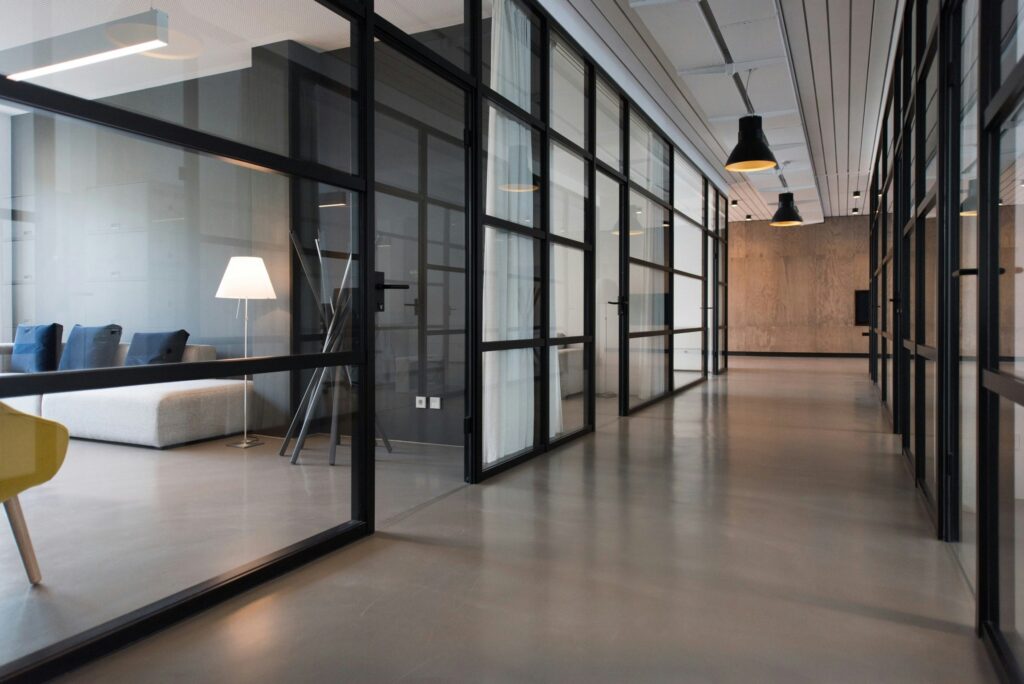A commercial lease agreement is a crucial document for any business intending to rent property. It dictates the terms between the landlord and tenant, affecting everything from business operations to financial planning. This article will guide you through key aspects, types, critical terms, and steps to consider when trying to obtain a favorable commercial lease agreement.
But, it would be wise not to do it on your own and to retain a commercial business attorney, like the team at Davis Business Law to help. Many of the lawsuits we handle involve commercial lease problems for clients who did not seek help from an attorney before they signed. We would like to help you avoid that result.
Key Takeaways
- Understanding the intricacies of commercial lease agreements, including their legal implications and terms, is essential for a business to build a solid foundation.
- It is wise to seek help from an experienced business attorney before signing a commercial lease.
- Key differences between commercial and residential leases, such as tenant responsibilities and regulations, necessitate careful consideration and due diligence.
- Thorough negotiation and legal advice can help secure more favorable lease terms and protect the tenant’s interests, particularly regarding maintenance, insurance, and personal guarantees.
Understanding the Basics of a Commercial Lease

Photo by Steijn Leijzer on Unsplash
A commercial lease is a legally binding contract executed between a landlord and a business owner to rent a property for business purposes. This agreement is crucial for establishing a long-term relationship between the lessor and the lessee. Commercial tenants can range from sole proprietors running small businesses to major multinational corporations, and the relationship typically involves a commercial property lease.
Signing a commercial lease is a significant step in a business owner’s entrepreneurial journey. It provides the business with a physical location that can influence brand identity, customer accessibility, and overall business operations. However, due to the complexity and long-term nature of many commercial leases, it is wise to seek counsel from an experienced business attorney before signing. An attorney can help navigate the fine print and avoid potential pitfalls.
Key Differences Between Commercial and Residential Leases
Commercial leases and residential leases differ significantly in terms of regulation and flexibility. Commercial leases have virtually no restrictions beyond basic contract law, allowing for a high degree of customization. In contrast, a residential lease is more heavily regulated to protect consumers. This flexibility in commercial leases means tenants can negotiate a wide range of terms to better suit their business needs.
One of the key differences is the level of responsibility placed on tenants. In commercial leases, tenants typically have greater obligations, such as being responsible for property taxes and maintenance. This contrasts with residential leases, where landlords are often responsible for most property-related expenses.
For business owners moving from residential to commercial leases, recognizing these differences is vital. It underscores the need for due diligence and the potential for customized agreements that can substantially affect business operations and expenses. Cases our attorneys often see are disputes over who is responsible for replacing a furnace, for example.
Critical Terms in a Commercial Lease Agreement
Assessing the lease duration ensures it fits your business’s needs. Commercial leases usually span three to five years, allowing long-term planning. A shorter lease might lack stability, whereas a longer-term lease could become restrictive as your business changes.
Rent calculation is another critical aspect. Commercial leases often stipulate provisions for rent increases, commonly based on annual percentages. Knowing whether your rent is a fixed amount, a percentage of sales, or subject to periodic increases is key for budgeting. Furthermore, most leases demand a security deposit, outlining return procedures and obligations.
Additional costs are also a significant consideration. These can include building insurance, property taxes, and Common Area Maintenance (CAM) charges, as well as maintenance costs. Reviewing responsibility for these costs is critical to avoid unexpected expenses.
Lastly, a use clause defines allowable activities on the property, protecting both the landlord and the tenant from disputes over the intended use of the space. Knowing these crucial terms aids in creating an agreement that is fair and aligns with your business strategy and financial planning.
Types of Commercial Leases

Photo by Nastuh Abootalebi on Unsplash
Commercial leases come in various types, each with its own set of terms and conditions. The four main types are:
- Gross rent lease: includes a flat amount that encompasses rent, property taxes, utilities, and insurance, with the landlord responsible for those costs.
- Net lease: tenants pay a lower base rent plus some or all of the property expenses.
- Percentage lease: rent is based on a percentage of the tenant’s sales revenue.
- Variable lease: rent can change based on certain conditions or time periods.
Understanding these types can help you make informed decisions when entering into a commercial lease.
A net lease is where the tenant takes on more building expense responsibilities beyond base rent. Types of net leases include single-net lease, double-net lease, and triple-net leases. In a single net lease, tenants pay base rent plus a portion of property tax. A double net lease requires tenants to cover property taxes and building insurance premiums, offering lower base rents in return. A triple net lease is the most comprehensive, where tenants cover base rent, property taxes, insurance, and CAM charges.
Percentage leases are common in retail settings like shopping malls. In these leases, the tenant pays a fixed rent plus a percentage of their business profits. This percentage rent lease creates incentives for landlords to maintain prime locations that benefit tenants.
Variable leases, such as index leases or graduated leases, adjust rent based on a market index or have scheduled rent increases. Choosing the right lease type depends on your business needs and risk tolerance. Each type has its advantages and disadvantages, and understanding these can help you select a lease that best supports your business operations.
Steps to Take Before Signing a Commercial Lease

Before signing a lease, it’s crucial to conduct thorough due diligence. Start by investigating the property’s surroundings and the landlord’s reputation. This information can influence your lease negotiations and help you understand the potential clientele and business success in the area.
Research zoning laws to ensure the landlord’s designated use aligns with municipal laws. Zoning laws can affect your ability to operate certain types of businesses in specific areas. Additionally, retaining a business attorney can help explain the lease’s fine print and avoid misunderstandings. Legal advice is invaluable in identifying any unfavorable clauses that could affect your business operations.
Finally, before beginning lease negotiations, assess your company’s current and future commercial space requirements. Understanding your space needs will help you choose a lease that accommodates your business growth and operational needs, ensuring a mutually beneficial agreement to rent space with the landlord.
Negotiating Your Lease
Negotiating a business lease requires careful planning and strategy. Each lease is negotiable and should align with the tenant’s business needs. An experienced business attorney can negotiate the terms of the lease with the landlord, ensuring favorable terms.
Researching local market rents can strengthen your bargaining position by providing a benchmark to compare against the landlord’s asking price. Additionally, consider requesting tenant inducements like rent-free periods or financial support for renovations, especially if the property has been vacant. These incentives can significantly reduce your initial costs and improve your cash flow.
It’s also essential to specify future increases in base rent and incidentals in the lease to better manage budgeting. Understanding lease renewal options, including timing and conditions, helps maintain flexibility for future business needs.
Lastly, landlords frequently require personal guarantees to mitigate financial risks associated with lease defaults. Negotiation strategies can reduce personal risk in guarantees, such as limiting the duration of the guarantee or including options for lease assignment.
Effective negotiation can lead to a lease agreement that supports your business’s long-term success and financial stability.
Legal Protections for Commercial Tenants
Legal protections for tenants in commercial leases are less comprehensive than those available to residential tenants. Generally, commercial tenants have no rights outside of the lease agreement, and each jurisdiction has its own laws dictating tenant rights. This makes it crucial to have a well-drafted lease agreement that covers all potential issues.
Involving a commercial lawyer in the lease negotiations can help avoid unexpected expenses and mistakes. Experienced business attorneys can help navigate lease agreements and protect tenant interests. They can review the lease, suggest necessary changes, and negotiate on your behalf to ensure that the terms are fair and reasonable.
Understanding the legal landscape and securing appropriate legal advice can provide significant protection and peace of mind for commercial tenants.
Common Issues and How to Address Them
Common issues in commercial leases often include holdover rent, disputes about lease terms, and non-payment. Holdover rent refers to a rent increase when a tenant remains in the property after the lease has expired; this increase can be up to 250 percent of the regular rent. Clear terms and conditions regarding lease renewal and termination help avoid such issues.
Disputes about lease terms frequently arise from disagreements over responsibilities due to vague provisions included in the lease agreement. A detailed and specific lease outlining each party’s responsibilities can prevent these disputes.
If a tenant fails to pay rent, a landlord can initiate collections actions or commence eviction proceedings to recover unpaid amounts. Awareness of these common issues and strategies to address them helps maintain a positive and productive landlord-tenant relationship.
Importance of Reviewing Maintenance and Renovation Clauses
Clarifying maintenance responsibilities is vital to avoid disputes over property upkeep. Typically, landlords handle significant repairs, while tenants manage routine maintenance tasks. Ensuring clarity in repair and maintenance clauses helps prevent disputes between landlords and tenants in the context of property management.
Renovation clauses are equally important. They should specify whether tenants can modify the property and who will pay for these modifications. Ensure that any planned renovations are allowed under the lease and consider negotiating for landlord reimbursement of improvement costs.
Having clear and detailed provisions regarding maintenance and renovations can safeguard your business operations and avoid unnecessary expenses.
The Role of Insurance in a Commercial Lease

Photo by Mark König on Unsplash
Business leases often require tenants to maintain liability and property damage insurance, with specific terms outlined in the lease. Landlords often mandate tenants to obtain liability insurance to avoid financial responsibility for accidents or injuries occurring on the property. General liability insurance is the most requested coverage in a business lease, safeguarding against third-party injury and property damage claims.
Landlords may also require tenants to carry business interruption insurance, which compensates for lost income due to unexpected business closures. Additionally, commercial property insurance is important for tenants to cover losses related to their own business assets, which are not protected by the landlord’s insurance.
A certificate of insurance is often needed by landlords to confirm that tenants hold adequate insurance coverage before lease approval. Understanding and securing the necessary insurance coverage is crucial for protecting your business and complying with lease requirements.
Personal Guarantees in Business Leases
Image by rawpixel.com
A personal guarantee in a lease requires the tenant to personally guarantee the lease, making them liable for charges if the business cannot pay. This means that the tenant is personally liable for any rent or charges if the corporation or LLC cannot pay.
Given the potential risks, it is particularly important to seek help from a business attorney before signing a lease that requires a personal guarantee.
Summary
Securing a favorable agreement is a complex but essential part of running a successful business. From understanding the basics to negotiating terms, knowing your legal protections, and addressing common issues, being well-informed can save you time, money, and stress.
Remember to engage legal counsel and thoroughly review all aspects of the lease to ensure it aligns with your business goals. With the right preparation and knowledge, you can secure a lease that supports your business’s growth and success.
Frequently Asked Questions
What does ‘permitted use’ refer to in a business lease?
Permitted use defines the specific business activities a tenant is allowed to conduct on the property, ensuring compliance with lease terms. This restriction typically reflects the agreed-upon business type outlined in the lease agreement.
What is a holdover rent?
Holdover rent occurs when a tenant remains in a property after their lease term has expired, resulting in a potential rent increase of up to 250 percent of the normal rent. It’s crucial to be aware of this to avoid unexpected financial burdens.
What should you do if you find a clause in a lease that is unfavorable?
If you find an unfavorable clause in a business lease, you should negotiate to add specific terms that better protect your business interests. Clear communication with the landlord can lead to a more favorable agreement.
Why is it important for both parties to have a lawyer review the agreement?
It’s crucial for both parties to have a lawyer review the agreement to ensure they fully understand the legal terms and protect their interests. This helps prevent potential disputes and ensures a fair and clear agreement.
What is the potential consequence of not having a lawyer review a lease?
Without a lawyer reviewing your business lease, you risk entering an unfavorable agreement that could have long-term negative consequences for your business, such as a costly lawsuit. It’s essential to ensure your rights and interests are protected.

